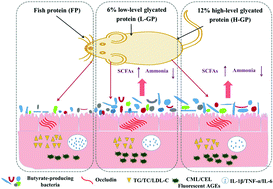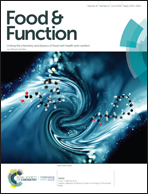Glycated fish protein supplementation modulated gut microbiota composition and reduced inflammation but increased accumulation of advanced glycation end products in high-fat diet fed rats†
Abstract
This study first investigates how the intake level of glycated fish protein (GP), enriched with Amadori products, affects gut health by modifying the fermentation of gut microbiota and accumulation of advanced glycation end products (AGEs) in rats fed a high-fat diet. Hyperlipidemic rats were fed a fish protein (FP) control diet, 6% low-level GP (L-GP) diet, and 12% high-level GP (H-GP) diet for four weeks. Compared to the FP diet, the GP diet greatly changed the pattern of protein fermentation and reduced inflammation markers and blood lipids, but increased the AGE plasma accumulation and fecal excretion. Furthermore, the GP supplementation significantly decreased Ruminiclostridium_6 and Desulfovibrio (p < 0.05), and the L-GP diet showed more effects on the increase of butyrate-producing Ruminococcus_1 and Roseburia, while the H-GP diet considerably decreased Helicobacter and Lachnospiraceae_NK4A136_group. Correlation-type principal-component analysis (PCA) clearly indicated that these biological effects of intake of GP were related to the modulation of gut microbiota composition and fermentation metabolite profiles. Overall, the low intake level of glycated fish protein may have a more beneficial effect on gut health.



 Please wait while we load your content...
Please wait while we load your content...